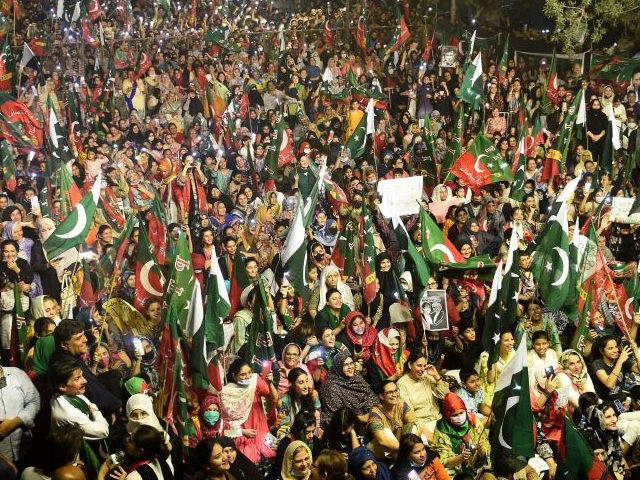Tens of thousands of people gathered on Sunday night across dozens of Pakistani cities to protest against the removal of Imran Khan from the office of Pakistan’s prime minister through a “no confidence” vote earlier Sunday, with “more than 20,000 people” taking to the streets of the southern port city of Karachi, Al Jazeera reported.
“In the southern Arabian Sea port city of Karachi, more than 20,000 people shouted slogans promising Khan’s return to power,” the Qatari news outlet relayed on April 11.
Former Prime Minister Imran Khan, on April 10, shared on Twitter video footage of the gargantuan Karachi protest, which seemingly flooded streets for miles in all directions from a central square in the city.
“Never have such crowds come out so spontaneously and in such numbers in our history, rejecting the imported govt led by crooks,” Khan wrote in an accompanying caption to the video post on Sunday night.
While Khan did not explicitly state where the video footage was filmed, its imagery coupled with a distinctive song (reportedly the Pakistani national anthem) chanted by participants appeared to match that captured by a separate video attributed to Karchi’s Sunday night protest by Dawn, a Karachi-based newspaper.
Demonstrations in support of Khan took place largely at the urging of the former prime minister’s political party, Pakistan Tehreek-i-Insaf (PTI), which organized rallies across 49 separate cities throughout Pakistan on Sunday night from 8:00 pm to 10:00 pm local time.
While PTI successfully spurred its largely male adult members to pour onto Pakistani streets on Sunday evening, Al Jazeera noted that “the youth, who make up the backbone of Khan’s supporters, dominated the crowds.” Dawn reported witnessing “women and children” in attendance at several rallies, such as that in Karachi.
Protests in support of Khan additionally took place abroad on April 10, in Dubai, United Arab Emirates (U.A.E.), and in two sites in London: Hyde Park and outside the residence of Khan’s political rival, Nawaz Sharif.
Nawaz’s brother, Shehbaz Sharif, replaced Khan as Pakistan’s prime minister on April 11. Nawaz Sharif is a former prime minister of Pakistan (2013-2017). Pakistan’s Supreme Court, in 2017, removed Nawaz from office on suspicion of corruption. The court subsequently convicted Nawaz a year later of corruption and banned him from ever holding political office in Pakistan again.
A “no confidence” vote by Pakistan’s National Assembly deposed Imran Khan on April 10 after 174 legislators out of 342 (two more than needed for a simple majority) voted to oust the leader.
Khan had fought the planned “no confidence” vote, which was originally proposed by Pakistani opposition parties on March 8. The former prime minister, elected in 2018, accused the U.S. State Department on March 27 of spurring Pakistan’s opposition to seek the “no confidence” motion as part of Washington’s alleged effort to remove Khan from power and enact greater regime change in Pakistan.
Khan, on April 3, temporarily stayed the “no confidence” vote when his political ally, Pakistan National Assembly Deputy Speaker Qasim Khan Suri, declared the action “unconstitutional.” The former prime minister additionally directed Pakistan President Arif Alvi to dissolve Pakistan’s Parliament later that day, which would have paved the way for fresh national elections.
Pakistan’s Supreme Court on April 7 overturned Suri’s declaration of the “no confidence” motion as unconstitutional along with Arif’s dissolution of parliament. The court’s ruling restored the National Assembly’s plans to hold a “no confidence” vote on April 10.

COMMENTS
Please let us know if you're having issues with commenting.